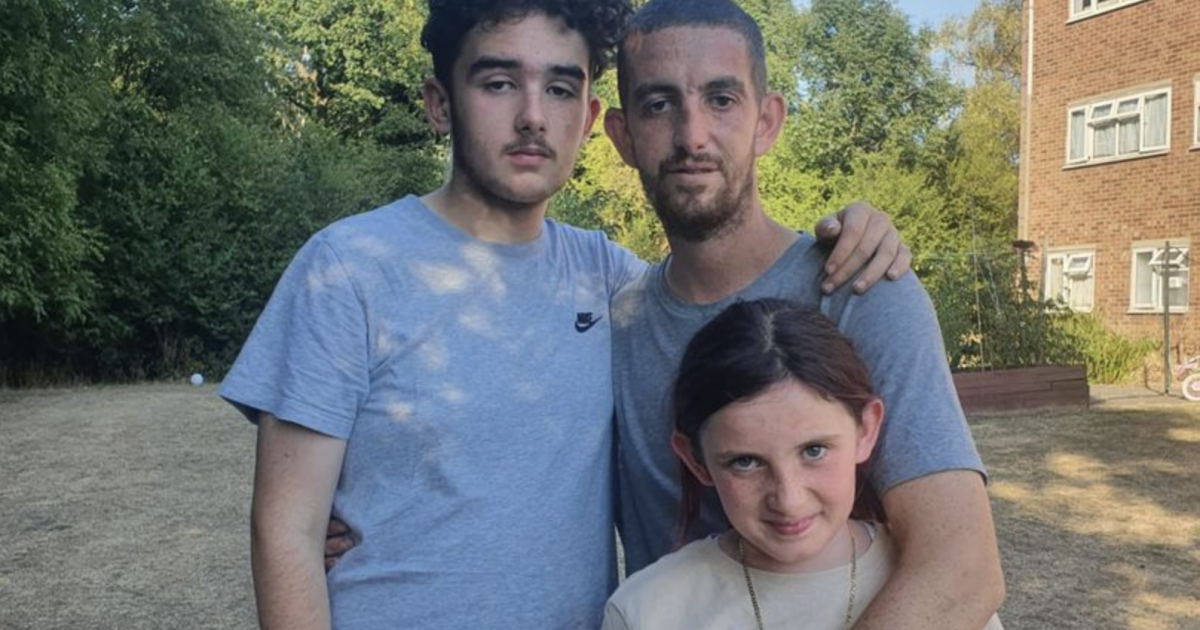Learning about Pancreatic Cancer
- Darren Mulqueen is a pancreatic cancer warrior whose doctors made a mistake. They dismissed his back pain as a simple muscular issue for months before they discovered his cancer.
- Pancreatic cancer is an aggressive disease that is difficult to detect because symptoms including jaundice and weight loss typically present at a later stage in the cancer's development.
- Being your own advocate can be key to coming to a correct cancer diagnosis and obtaining the best treatment possible while dealing with a diagnosis.
When the 34-year-old father of two first went to his doctor, he was told his pain was muscular and given Tylenol to mitigate his symptoms. But the former military man spent months in increasing pain despite continued doctor’s visits.
Read More"We are heartbroken and devastated," Vassell said. "Darren is the most amazing brother, son, dad and uncle, and we can't imagine life without him.”
Mulqueen is now a permanent resident at the hospital and receiving morphine to treat his pain. He’s not doing well, but he wants others to learn from his story.
“I spoke to Darren this morning and he said to me the one thing he wants people to know and for people to share with their friends and family is please, please go to the hospital if you have pain in your back or tummy or anywhere that doesn't feel right," Vassell said. "Don't take no for an answer. Doctors can get it wrong and Darren is proof of that.
“My mum is suffering with pain in her back and has booked in a test. We are all going to get a test.”
If you’d like to learn more about Mulqueen’s story or donate to help him and his family, check out their GoFundMe page.
Pancreatic Cancer Detection
Pancreatic cancer is an aggressive disease that is difficult to detect because symptoms including jaundice and weight loss typically present at a later stage in the cancer's development. In a previous interview with SurvivorNet, Dr. Anirban Maitra, the co-leader of the Pancreatic Cancer Moon Shot at MD Anderson Cancer Center, explains what he typically sees when patients develop this disease.
"Because the pancreas is inside the abdomen often doesn't have symptoms that would tell you that something is wrong with your pancreas," he says. "By the time individuals walk into the clinic with symptoms like jaundice, weight loss, back pain or diabetes, it's often very late in the stage of the disease."
Detecting Pancreatic Cancer Early Is Crucial
Parents, siblings and children of someone with pancreatic cancer are considered high risk for developing the disease because they are first-degree relatives of the individual. PGVs (pathogenic germline variants) are changes in reproductive cells (sperm or egg) that become part of the DNA in the cells of the offspring. Germline variants are passed from parents to their children, and are associated with increased risks of several cancer types, including pancreatic, ovarian and breast cancers. Germline mutations in ATM, BRCA1, BRCA2, CKDN2A, PALB2, PRSS1, STK11 and TP53 are associated with increased risk of pancreatic cancer.
Jessica Everett, a genetic counselor at NYU Langone's Perlmutter Cancer Center, encourages people in this category to look into possible screening options.
"If you're concerned about pancreatic cancer in your family, start by talking to a genetic counselor to learn more about your risk and what options you have," Everett said.
Advocating for Your Health
It's always important to pay attention to the changes happening to your body and insist that medical professionals investigate.
You have every right to insist that your doctors investigate any possible signs of cancer, other avenues for treatment or the potential of a different diagnosis. And if you simply don't know what's causing a change to your body, you should still seek professional help. You never know when speaking up about an issue can lead to a very important diagnosis cancer or otherwise.
Be Pushy, Be Your Own Advocate… Don't Settle
"Every appointment you leave as a patient, there should be a plan for what the doc is going to do for you, and if that doesn't work, what the next plan is," Dr. Zuri Murrell, director of the Cedars-Sinai Colorectal Cancer Center, told SurvivorNet in a previous interview. "And I think that that's totally fair. And me as a health professional that's what I do for all of my patients."
In a previous interview with SurvivorNet, April Knowles explained how she became a breast cancer advocate after her doctor dismissed the lump in her breast as a side effect of her menstrual period. Unfortunately, that dismissal was a mistake. Knowles was diagnosed with metastatic breast cancer at age 39. She said the experience taught her the importance of listening to her body and speaking up when something doesn't feel right.
I Wanted My Doctor To Like Me, Then He Missed My Breast Cancer
"I wanted my doctor to like me," she said. "I think women, especially young women, are really used to being dismissed by their doctors."
Figuring out whether or not you actually have cancer based on possible symptoms is critical because early detection may help with treatment and outcomes. Seeking multiple opinions is one way to ensure you're getting the care and attention you need.
Another thing to remember is that not all doctors are in agreement. Recommendations for further testing or treatment options can vary, and sometimes it's essential to talk with multiple medical professionals.
Learn more about SurvivorNet's rigorous medical review process.


